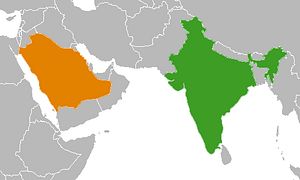India and Saudi Arabia signed a Memorandum of Understanding (MoU) on Defense Cooperation on Wednesday in New Delhi. The MoU is the result of Prince Salman bin Abdulaziz al Saud’s visit to India. al Saud is the crown prince, the deputy prime minister, and the defense minister of Saudi Arabia. His visit to India marks the highest-level visit by a Saudi leader to India since King Abdullah bin Abdulaziz al Saud visited the country in 2006.
The agreement was signed between Dr. Nizar Bin Obaid Madani, Saudi Minister of State for Foreign Affairs, and Jitendra Singh, Indian Minister of State for Defense. The two sides additionally discussed a range of bilateral issues and intend to deepen their cooperation as part of their strategic partnership. According to Livemint, the MoU “will allow exchange of defense-related information, military training and education as well as cooperation in areas varying from hydrography and security to logistics.”
The first indicator that India and Saudi Arabia were serious about cooperating on defense matters came in 2012 when the first meeting of the India-Saudi Arabia joint committee on defense cooperation took place in New Delhi. Back then, the two expressed interest in defense exchanges and increasing military-to-military contacts. The 2012 meeting was spearheaded by Saudi Major General Suleiman Saleh al-Khalifa, Chief of Armed Forces Operations.
The cornerstone of the strategic partnership between India and Saudi Arabia in recent years has been the 2010 Riyadh Declaration. Signed between King Abdullah and Indian Prime Minister Manmohan Singh, the declaration set forth a roadmap for a closer Saudi-Indian bilateral relationship even though it was relatively light on defense cooperation. The Riyah Declaration built on the 2006 Delhi Declaration which was signed during King Abdullah’s trip to New Delhi. The Delhi Declaration was the first major bilateral interaction between India and Saudi Arabia; both sides acknowledged it to herald a “new era” in Indo-Saudi ties.
The two found it difficult to forge closer ties earlier given Saudi Arabia’s support for Pakistan both materially and diplomatically. Saudi Arabia supported Pakistan during the India-Pakistan War of 1971. King Abdullah’s 2006 visit to India and the Delhi Declaration saw the bilateral relationship develop independently of Saudi Arabia’s relationship with Pakistan, which continues to be close. India’s interest in Saudi Arabia stems from the latter’s role as a major energy supplier and regional power. Additionally, approximately 2.88 million Indian nationals live in Saudi Arabia, comprising the largest expatriate community there.
For Saudi Arabia, the defense pact with India comes a month after it concluded a defense cooperation agreement with Indonesia, signaling increased attention eastwards by Riyadh. Riyadh traditionally pursues close relations with significant Muslim countries across the world. Although Muslims are a minority in India – comprising around 12 percent of the total population – India has the third largest Muslim population globally in absolute numbers. Approximately 100 million Muslims live in India according to the 2010 Pew Research Estimate.
India’s foreign policy in the Middle East continues to remain relatively independent of the region’s geopolitical dynamics. The MoU on defense cooperation with Saudi Arabia comes at a time when India’s relations with Israel and Iran continue to remain warm.

































